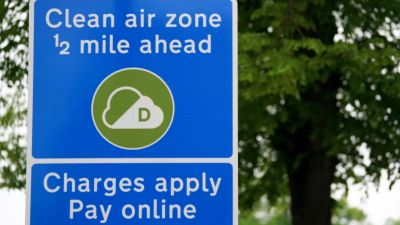Updated plans for Clean Air Zone in Greater Manchester to be submitted to Government

Updated plans for a Clean Air Zone (CAZ) in Greater Manchester are being prepared to be submitted to the Government.
It comes as the latest air quality data shows improvements on local roads across the city-region.
The preferred plan would still mean that there would be no charges for any vehicle driven on a road in the area.
There would also be investment in new buses and a fund to help taxi drivers upgrade their vehicles.
The plan would still meet a legal requirement to improve air quality by 2026 at the latest, rather than in 2025.
An alternative plan that models a benchmark charging Clean Air Zone in the centre of Manchester and bordering parts of Salford would not meet the legal deadline.
A key element is investment in cleaner buses, and latest figures show improvements in the Greater Manchester bus fleet is already helping to improve air quality.
Air quality monitoring data for 2023 showing that air pollution has fallen compared to 2022 – and is significantly lower than levels recorded pre-pandemic in 2019.
Five years ago, air quality monitoring data showed 129 locations of nitrogen dioxide exceedance. This has now fallen to 64 sites across the city region.
The gradual improvement has been partly driven by the investment in hundreds of cleaner buses, including Zero Emission Buses for the Bee Network.
Prior to franchising, less than 1% of vehicles were electric and that is now more than 10% in areas where buses are under local control – and will rise to more than 15% following completion of bus franchising in January, when around 70% of the fleet will be, on average, less than 12 months old.
It means that Greater Manchester is on target for a third of its bus fleet to be electric by 2027 and is working towards an ambition to have an all-electric bus fleet by 2030.
Leader of Bury Council and Clean Air lead for Greater Manchester, Cllr Eamonn O’Brien, said: “Poor air quality affects us all and particularly the most vulnerable among us – the young, old and those with health conditions.
"We have a longstanding commitment to cleaning up our air and Greater Manchester has carried out a tremendous amount of work to get us to a place where we are seeing air quality improvements.
“The latest air quality monitoring data shows a really encouraging trend and indicates that the steps we’ve already taken to invest in cleaner buses through the Bee Network are making real inroads to cleaning up the air we all breathe. And we’ve done this without the hardship to residents and businesses that a charging Clean Air Zone could cause.
“Given some of the changes that have occurred in the last nine months, there was a need to adapt and update our proposals for an investment-led, non-charging GM Clean Air Plan.
"We’re now in a position where that work has been done and, subject to approvals, we can submit our updated plan to the new government as soon as possible and await their decision.”
Want a quick and expert briefing on the biggest news stories? Listen to our latest podcasts to find out What You Need To know...